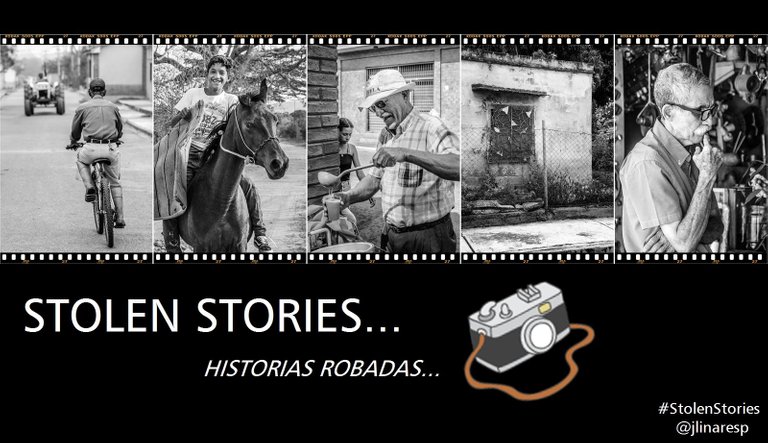
Hello dear #Hive friends!.... March is ending and nothing better to close the first quarter of the year than an edition of my photo series "Stolen Stories" and together (as usual) making this my participation in today's #monomad challenge.... Let's go then for those photos and their stories!.
¡Hola queridos amigos de #Hive!... Marzo está finalizando y nada mejor para cerrar el primer cuarto del año que una edición de mi serie fotográfica "Historias Robadas" y junto (como de costumbre) hacer de esta mi participación en el reto #monomad de hoy... ¡Vamos entonces por esas fotos y sus historias!.
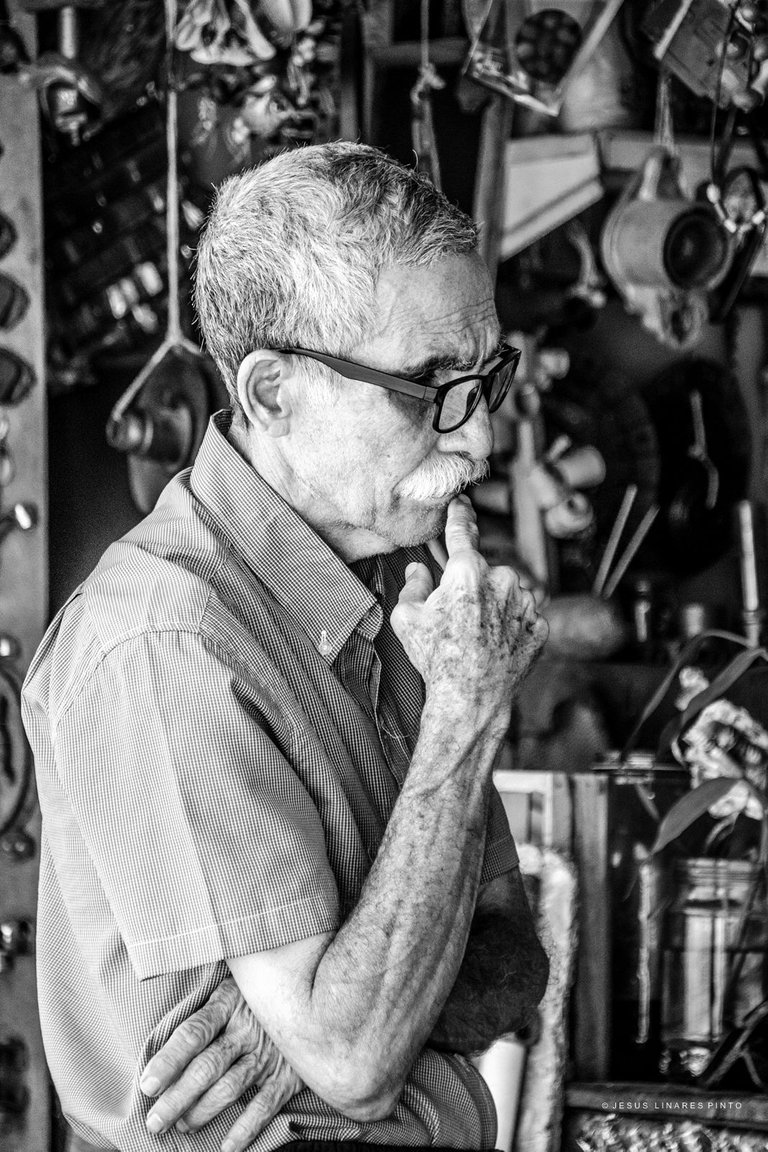
"Don Alberto, The Techaer" / "Don Alberto, El profesor"
Don Alberto was teaching Venezuelan History at my high school... It was the mid 80's.... Don Alberto was young then and my classmates and I were a horde of pre-adolescents worthy of being thrown into the flames of the Inquisition... However, Don Alberto would appear at the classroom door, pull a huge book out of his leather briefcase and sit down to read a paragraph or two about the day's class. His voice was low and small, just like his appearance... But every now and then he would look up, take a deep breath and begin to speak in a tone of voice that seemed to come from someone else... It was as if a "huge, angry, history-mad Viking" was taking over that wiry body... Then, we, all of us, absolutely all of us, were astonished and still... So we were ready to listen to the astonishing stories about our country, narrated with almost histrionic vehemence by that little giant who seemed suddenly possessed... Then he would put his book away and say goodbye with his usual slow, low voice... But boy, did he make us learn about Venezuelan history!
Don Alberto impartía clases de Historia de Venezuela en mi secundaria... Eran mediados de los años 80... Don Alberto era joven en aquel entonces y mis compañeros de aula y yo eramos una horda de pre-adolescentes dignos de ser lanzados a las llamas de la inquisición... Sin embargo, Don Alberto aparecía en la puerta del salón de clases, extraía un enorme libro de su maletín de cuero y se sentaba a leer algún párrafo relativo a la clase del día. Su voz era baja y menuda, al igual que su aspecto... Pero de vez en cuando alzaba la mirada, respiraba hondo y comenzaba a hablar en un tono de voz que parecía venir de otra persona... Era como si un "Vikingo enorme, furioso y apasionado por la historia" se apoderase de aquel cuerpo enjuto... Entonces, nosotros, todos, absolutamente todos, quedabamos atónitos y quietos... Así nos disponíamos a escuchar a las historias asombrosas sobre nuestro país, narradas con vehemencia casi histriónica por aquel pequeño gigante que parecía repentinamente poseso... Luego, él guardaba su libro y se despedía con su acostumbrada voz pausada y de bajo volúmen... ¡Pero vaya que sí nos hacía aprender de historia de Venezuela!.
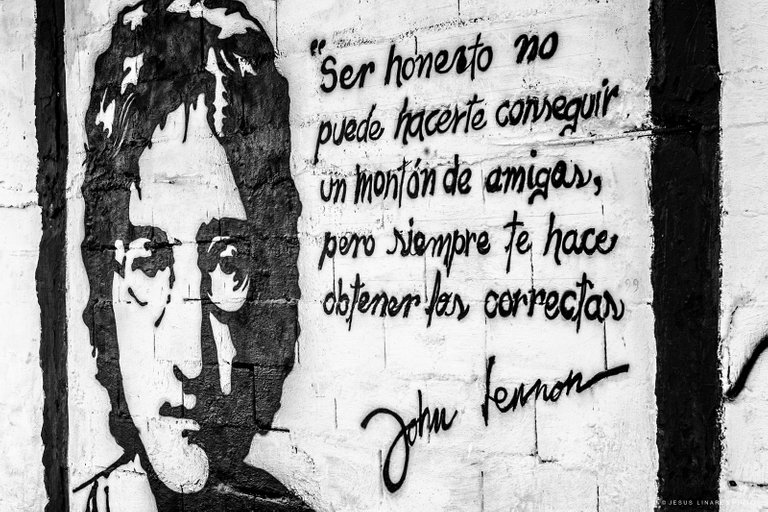
"Sometimes Lennon..." / "Algunas veces Lennon..."
Well, it's a small town and the economic crisis is so brutal that, all too often, people stop painting the walls of their houses so as not to spend money... So what are the chances that one day a street painting with John Lennon's face and one of his phrases will appear?... Well... these things can happen!
"Being honest may not get you a lot of friends, but it always gets you the right ones"... Nice phrase!...
Bien, es un pueblo pequeño y la crisis económica es tan brutal que, con demasiada frecuencia, las personas dejan de pintar las paredes de sus casas para no gastar dinero... Entones ¿Cuales son las posibilidades de que un día para otro aparezca una un pinta callejera con el rostro de Jhon Lennon y una de sus frases?... ¡Bueno!... ¡esas cosas pueden pasar!.
"Ser honesto no puede hacerte conseguir un montón de amigos, pero siempre te hace obtener los correctos"... ¡Linda frase!.
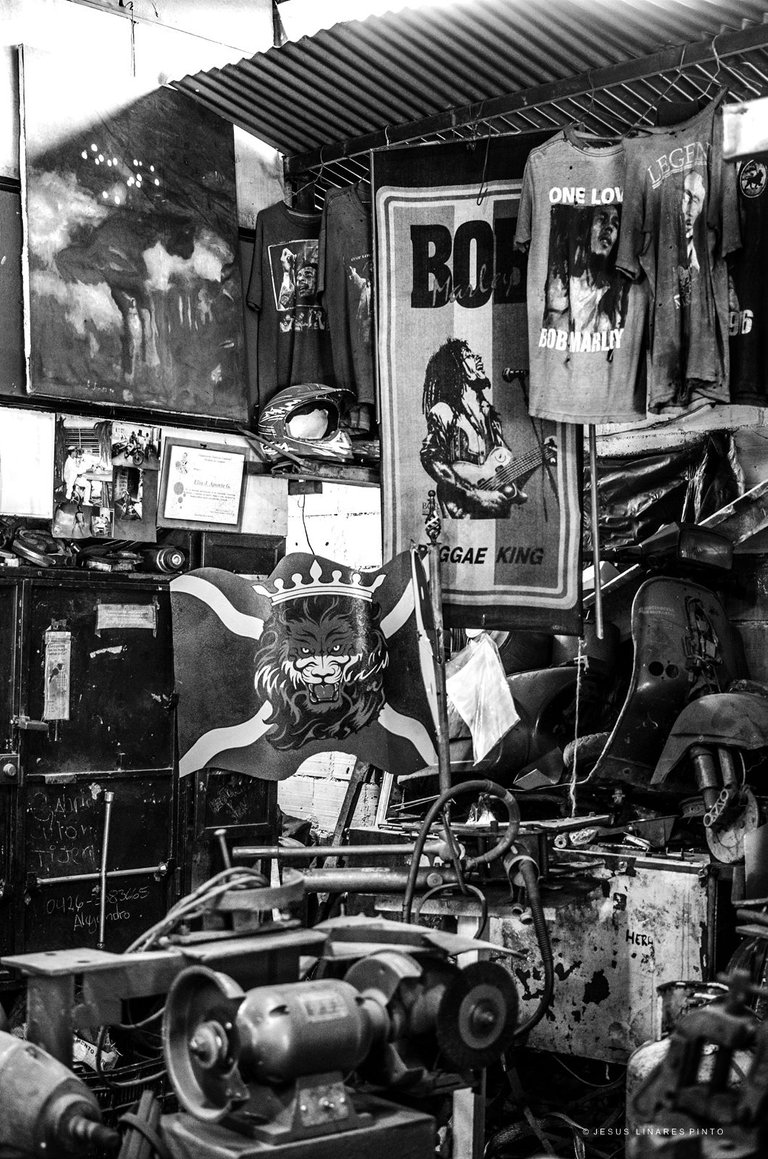
Elio's strange workshop!" / "¡El extraño taller de Elio!"
Entering the Elio's workshop (also known as "El Vespa" and who maybe some of you have seen in my previous publications) is like entering a kind of museum (maybe a psychiatric museum, but a museum nonetheless)... Helio arrived in our town in his twenties more than four decades ago and since then he has become a character and someone very much loved here.... He came here looking for fortune and knew how to do very few things, but someone in the village asked him if he had any knowledge of blacksmithing and he answered "yes" (without knowing anything about blacksmithing)... The story is long, but to make a long story short, Elio's blacksmith shop has just celebrated 40 years in operation!... That's faith!.... And as you can see, Elio is a fan of Bob Marley, Vespa motorcycles, artistic paintings and a lot of other things.
Entrar al taller de Elio (también conocido como "El Vespa" a quien quizás algunos de ustedes hayan visto en mis publicaciones anteriores) es como entrar a una especie de museo (quizás a un museo psiquiátrico, pero museo al fin)... Elio llegó a nuestro pueblo siendo un veinteañero hace más de cuatro décadas y desde entonces se ha convertido en un personaje y alguien muy querido aquí... Llegó aquí buscando fortuna y sabía hacer muy pocas cosas, pero alguien del pueblo le preguntó si tenía conocimientos de herrería y ELio le contestó que "sí" (sin saber nada de herrería)... La historia es larga, pero para resumir ¡El taller de herrería de Elio recién cumplió 40 años funcionando!... ¡Eso es tener fe!... Y como pueden ver, Elio es fanático de Bob Marley, de las motos Vespa, suele hacer pinturas artísticas y un sinfín de cosas más.
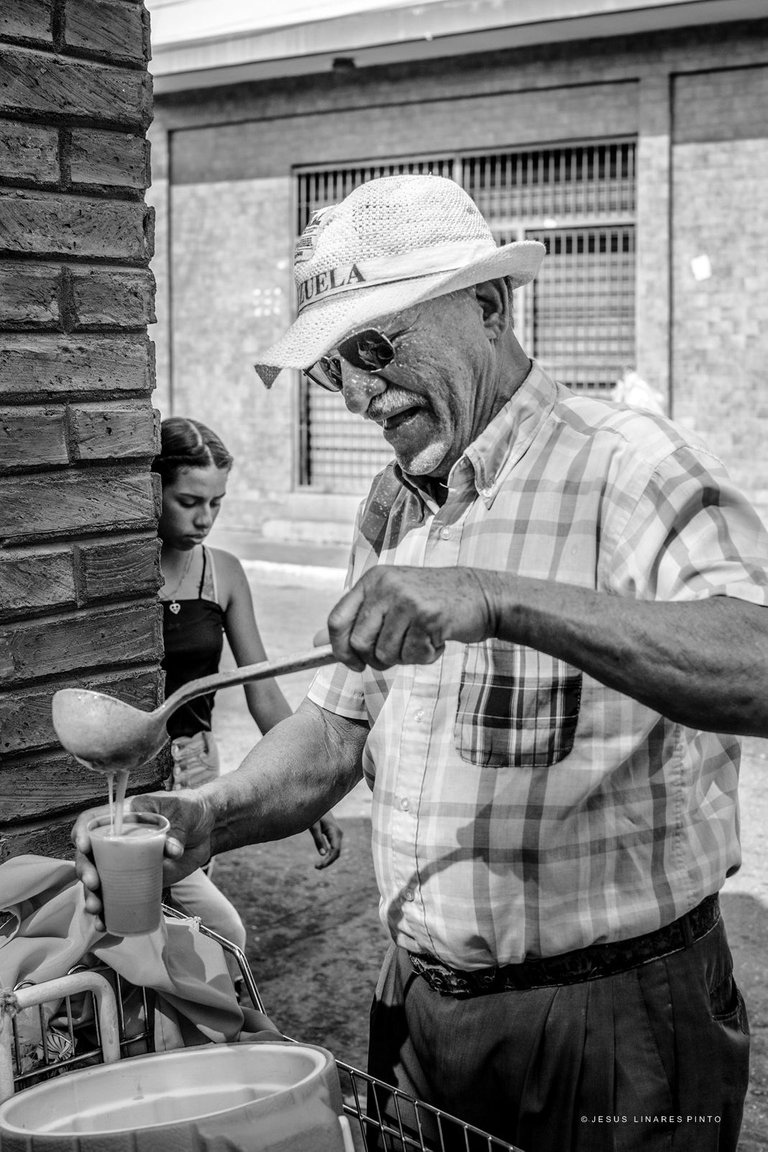
"Rafael, AKA: "Yes there is" / "Rafael, Mejor conocido como: "Sí hay"
Rafael has all his life selling "Caratillo" (a drink based on rice, water, sugar and cinnamon) in the streets of the town of Montalbán... He usually appears suddenly with his shopping cart and stands in the busiest corners of the town... He sits on a small stool that he carries with him and there he dedicates himself to talk to everyone in the street.... Then when he is greeted from afar he answers "Yes there is!" (referring to the availability of the drink he sells) and usually shouts out the prices of it according to the presentations available... In this photo, that "Caratillo" he's serving in a plastic glass is for me... It's something refreshing and delicious, I've been drinking them since I was very young!!!
Rafael tiene toda su vida vendiendo "Caratillo" (Una bebida a base arroz, agua, azúcar y canela) en las calles del pueblo de Montalbán... Suele aparecer repentinamente con su carrito de automercado y apostarse en las esquinas más transitadas del pueblo... Se sienta en un pequeño banquillo que lleva con él y allí se dedica a hablar con todos en la calle... Entonces cuando le saludan de lejos él contesta "¡Sí hay!" (refiriéndose a la disponibilidad de la bebida que vende) y suele gritar los precios de la misma según las presentaciones disponibles.... En esta foto, ese "caratillo" que está sirviendo en un vaso es para mí... ¡Es algo refrescante y delicioso, los he bebido desde que era muy joven!.
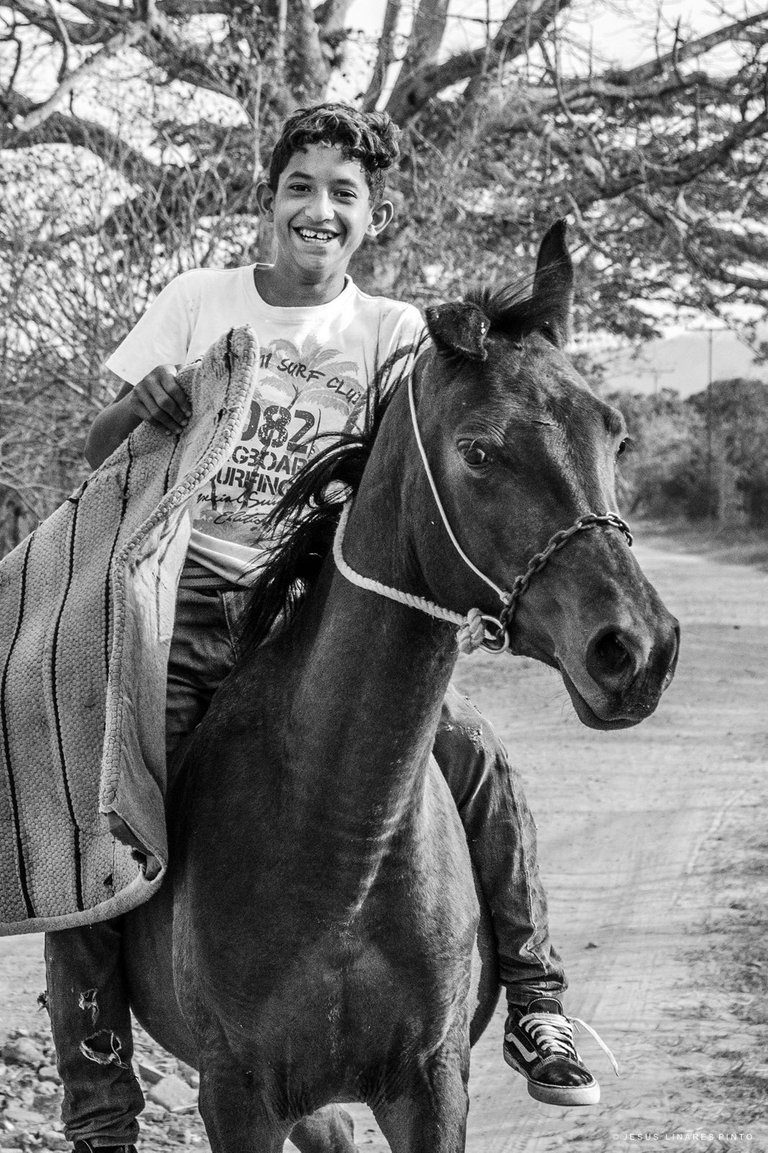
"Ricardo" / "Ricardo"
I had only seen young Ricardo from afar before I took this photo, he lives in the fields near the village, but I always see him riding by on his horse and he doesn't usually greet or stop.... However, that day, I shouted to him and said: "Come and take a picture" and he stopped and brought his horse to me... He then told me that his name is "Ricardo" and that the horses belong to his father, but he allows him to ride them and ride on the country roads.... That's definitely better than a bicycle!.... Ricardo doesn't use a saddle, just a small mat, but he takes it off when father doesn't see him, because (as he confesses) he likes to ride "bareback".
Al joven Ricardo le había visto de lejos antes de hacerle esta foto, vive en los campos cerca del pueblo, pero siempre le miro pasar raudo a lomos de su caballo y no suele saludar ni detenerse... Sin embargo, ese día, le grité y le dije: "Ven para hacerte una fotografía" y el chico se detuvo y llevó su caballo hasta mí... Entonces me dijo que se llama "Ricardo" y que los caballos son de su padre, pero él le permite montarlos y cabalgar por los caminos del campo... ¡Eso definitivamente es mejor que una bicicleta!... Ricardo no usa silla de montar, solo una pequeña estera, pero la quita cuando padre no lo ve, porque (según confiesa) le gusta cabalgar "a pelo".
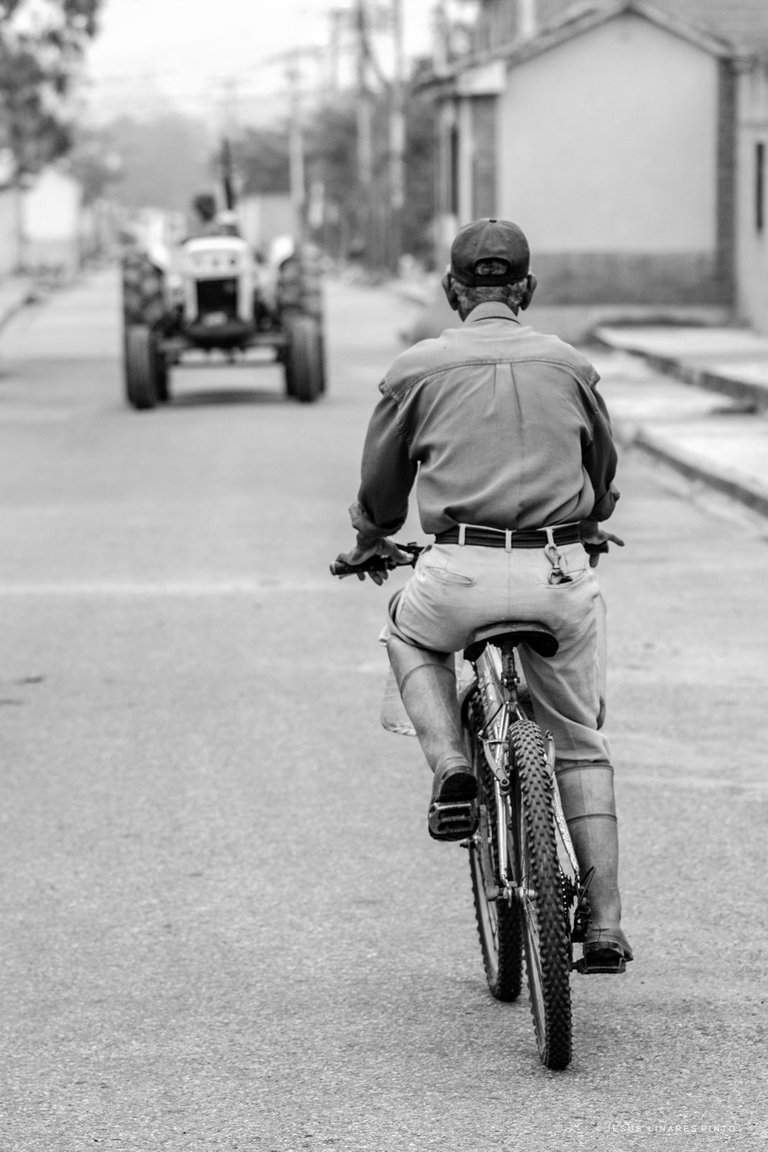
"Possible impact" / "Posible impacto"
Mr. Placido (on the bike) is well known for his long record of crashing into cars, dogs, people and even walls and street kiosks.... So seeing him going straight into that tractor, I wanted to take a picture before the impact!... he he he he..... :)) Fortunately Mr. Placido this time passed by without hitting such machinery!.... But don't worry, here everyone who knows him slows down when they see him on his bike and simply hopes that: "Placido hits them and not the other way around"... What a village thing to do!
El señor Plácido (en la bicicleta) es bien conocido por su largo registro de choques contra autos, perros, personas e incluso paredes y kioscos callejeros... ¡Así que al verle ir directo hacia ese tractor, quise hacer una foto antes del impacto!... je je je... :)) ¡Afortunadamente el señor Plácido esta vez pasó de largo sin chocar con semejante maquinaria!... Pero no se preocupen, aquí todos los que le conocen disminuyen la velocidad al verle sobre su bicicleta y simplemente esperan que: "Plácido les choque a ellos y no al revés"... ¡Vaya cosas de pueblo!
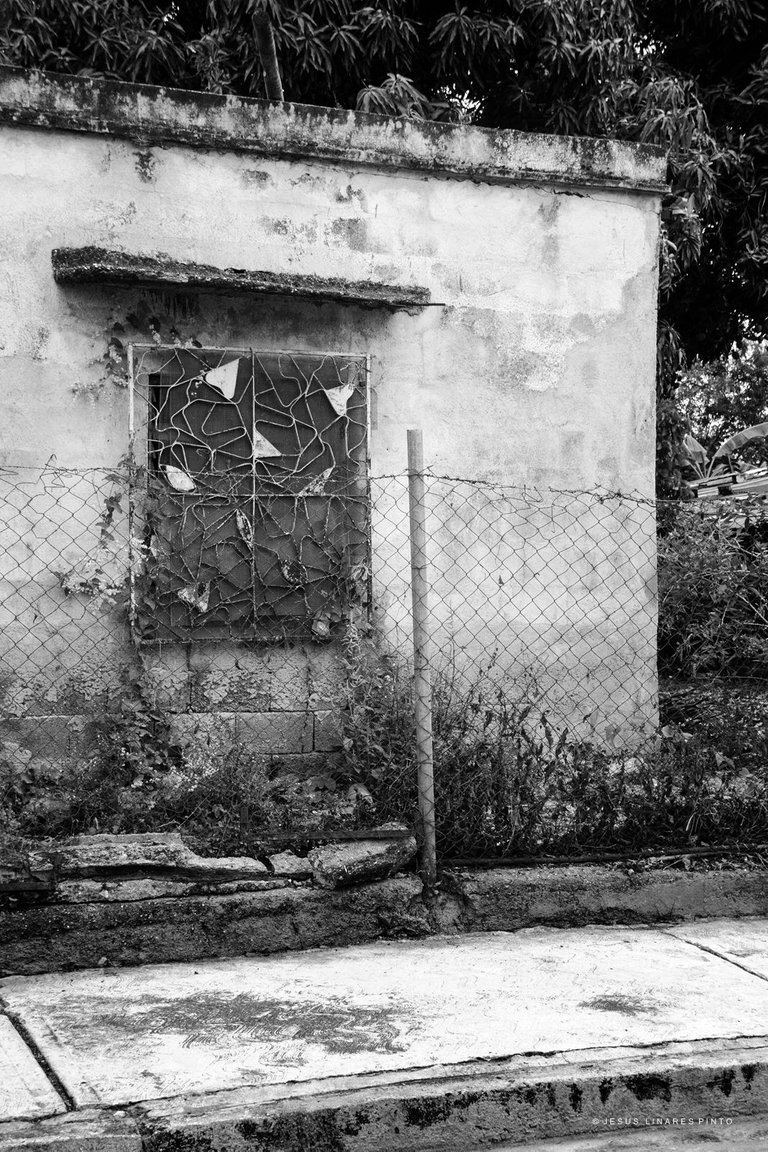
"Bye bye erika" / "Adiós Erika"
Erika was left alone, her daughter and son migrated to different countries, but she didn't want to leave Montalbán... The boys never came back and Erika never went to where they were.... The neighbors say that from one day to the next "all the years of the world fell on her", and she looked old and sad.... She only went to the grocery store in the afternoons to buy some groceries and her chewing tobacco paste... One day Erika did not go to the grocery store and her cat appeared hungry in her neighbors' backyard... Erika was gone, but not from the village.... She just went "out of the world" and left her house with its weird windows and peeling walls.
Erika se fue quedando sola, su hija y su hijo migraron a países distintos, pero ella no quiso salir de Montalbán... Los chicos nunca volvieron y Erika nunca fue a donde estaban ellos... Los vecinos dicen que de un día para el otro "todos los años del mundo cayeron sobre ella", y se le veía envejecida y triste... Solo iba al abasto por las tarde a comprar algunos víveres y su pasta de tabaco para mascar... Un día Erika no fue al abasto y sus gato apareció hambriento en el patio trasero de sus vecinos... Erika, se había ido, pero no del pueblo... Solo se fue "del mundo" y dejó allí su casa de ventanas raras y paredes descascaradas.
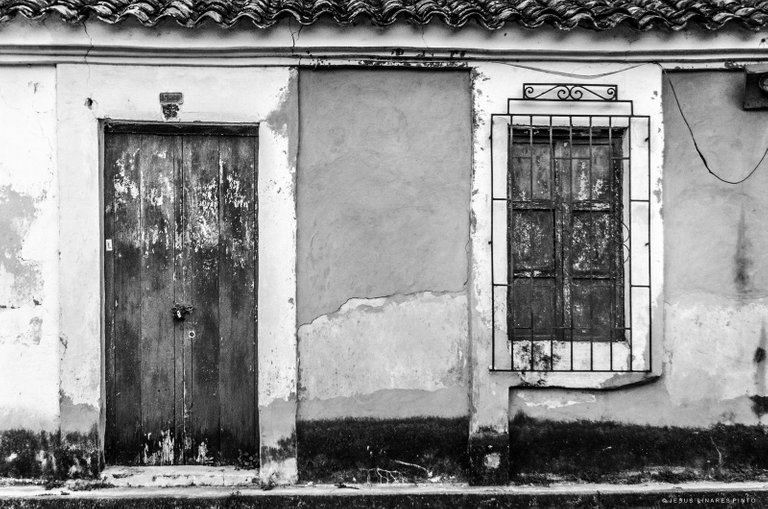
"Uncle Luis's house" / "La casa del Tio Luis"
My mother tells that her uncle Luis lived in that house. He had bought it to live with Helena, a girl with honey hair and olive eyes, whom he married when she was 16 and he was 20.... Luis was my grandmother Olimpia's brother, he had studied in the capital and had graduated as a land surveyor.... One day Luis left town to work with foreign companies that were building roads in the plains states.... He took a small suitcase and his inseparable German theodolite on his back... He left Helena in the care of the house, together with "Salvaje" his huge gray dog, he also left her a small chest with 5 gold coins, 20 silver forts and a handful of bambas, reales and cuartillos (all coins of those times... A small fortune!)... After 12 months Luis returned with more gold coins than any other young man in town.... But the house was alone, Helena had left, the gossips say that with a military man who was passing through the garrison.... Only "Salvaje" was waiting for him at the door, skinny and sad, but wagging his tail without stopping.... My mother says, my grandmother used to say, that poor Uncle Luis went crazy and began to measure all the streets and plots of the town with his old theodolite, until one day he dropped dead.
Mi madre cuenta que su tío Luis vivía en esa casa. La había comprado para vivir con Helena, una muchacha de cabellos de miel y ojos de aceituna, con quien se casó teniendo ella 16 años y él 20... Luis era hermano de mi abuela Olimpia, había estudiado en la capital y se había graduado de agrimensor... Un día Luis se fue del pueblo, a trabajar con empresas extrajeras que construían las carreteras en los estados llaneros... Se llevó una pequeña maleta y su inseparable teodolito alemán a cuestas... Dejó a Helena al cuido de la casa, junto a "salvaje" su perro enorme y gris, también le dejó un pequeño cofre con 5 monedas de oro, 20 fuertes de plata y un puñado de bambas, reales y cuartillos (todas monedas de esos tiempos... ¡Una pequeña fortuna!)... Después 12 meses Luis regresó con más monedas de oro que ningún otro hombre joven del pueblo... Pero la casa estaba sola, Helena se había marchado, dicen las malas lenguas que con un militar que estuvo de paso en la guarnición... Solo "Salvaje" lo esperaba en la puerta, flaco y triste, pero moviendo la cola sin parar... Dice mi madre, que decía mi abuela, que el pobre Tío Luis enloqueció y comenzó a medir todas las calles y solares del pueblo con su viejo teodolito, hasta que un día cayó muerto.
Gosh, I've loved doing this post and writing all of this.... Thank you all so much for stopping by and appreciating my photos and my lines!.... See you soon again with more photos, more black and white, more streets and more stories between us.... You are loved a lot!
Cielos, he amado hacer este post y escribir todo esto... ¡Muchas gracias a todos por pasar por aquí y apreciar mis fotos y mis lineas!... Nos veremos pronto nuevamente con más fotos, más blanco y negro, más calles y más historias entre nosotros... ¡Se les quiere un montón!.
"We make photographs to understand what our lives mean to ourselves." - Ralph Hattersley.
"Hacemos fotografías para comprender lo que nuestras vidas significan para nosotros mismos." - Ralph Hattersley.

Cámara: Nikon D7000 | Objetivo: Sigma 18-200mm f3.5-6.3 II DC OS HSM
Montalbán, Carabobo, Venezuela.








